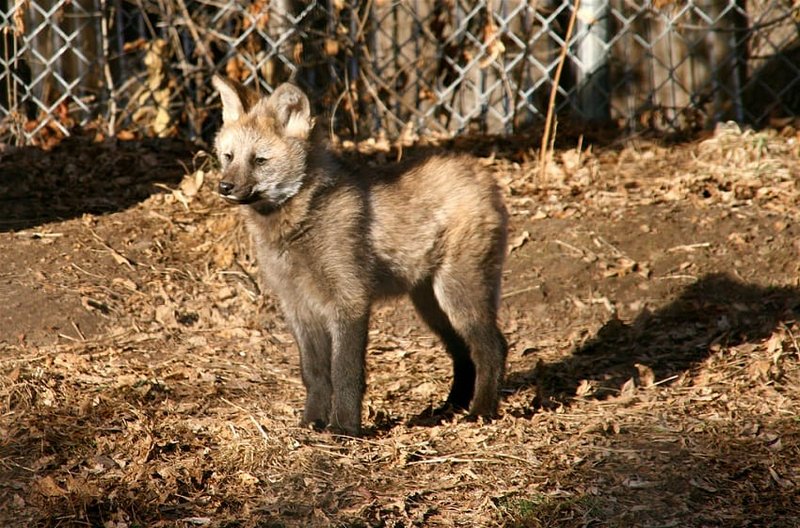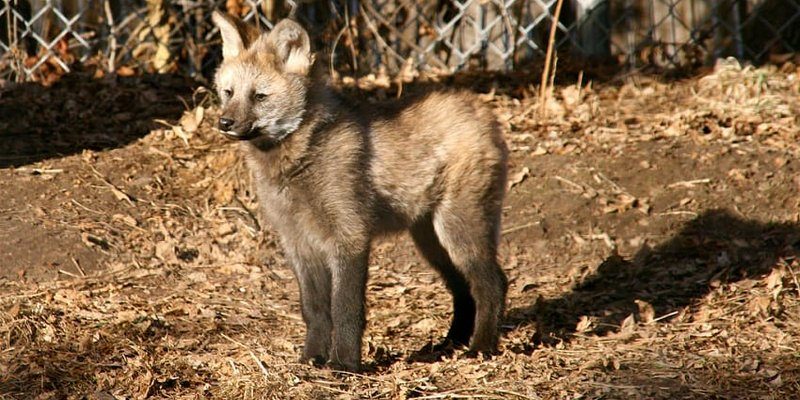
In the wilds of South America, where these striking animals roam, the challenges of survival are significant. Maned wolves need to find food, protect their territory, and keep their young safe from threats. Just like in human families, teamwork is essential for success. So, let’s explore how maned wolves raise their young, from courtship and den selection to the different stages of puppy development.
The Courtship Ritual of Maned Wolves
Finding a mate is the first step in the maned wolf’s family journey. During the breeding season, which typically takes place from November to April, these animals engage in complex courtship displays. Let me explain: maned wolves communicate through a series of vocalizations, scents, and body language. They might howl, yip, or even make a sound that resembles a bark to signal their interest.
Once they’ve found a partner, they often mate for life. This strong bond is crucial because it sets the foundation for raising their young. After mating, the female maned wolf goes through a gestation period of about two months. During this time, both parents will start preparing for the arrival of their pups, marking their territory to ensure it’s safe and secure.
Den Selection: A Cozy Home for Pups
Choosing the right spot for their young is essential for maned wolves. They typically seek out burrows abandoned by other animals or create their own dens in tall grasslands. This hidden home acts as a shelter from predators and harsh weather, giving their pups a safe place to grow and explore.
The den is not just a physical space; it represents security for the young. Maned wolves often line the den with grass and leaves to make it cozy. Here’s the thing: nurturing an environment where their pups can feel safe is vital for their development. The parents frequently visit to check on them and provide food, forming a protective bubble around their little ones.
Puppy Development: From Birth to Independence
Once the pups are born, they stay hidden in the den for the first few weeks. This period is crucial because they’re entirely dependent on their parents. Newborn maned wolf pups are blind and deaf, relying solely on their mother’s care. The female will nurse them, providing all the nutrients they need during this early stage.
As the weeks go by, the pups grow rapidly. Around four weeks old, their eyes begin to open, and they start to explore their surroundings. You might be wondering how they learn from their parents. Well, the father plays a significant role here by bringing food back to the den, even regurgitating it for the pups to eat. This behavior teaches the young wolves about foraging for food in their natural habitat.
Social Learning Through Play
Playtime is an essential part of a maned wolf’s upbringing. The pups engage in playful interactions with their siblings, which helps them develop vital social skills. Just like human children, they learn through play—practicing hunting techniques, problem-solving, and teamwork.
During this phase, you might see them tussling, chasing each other, or even pretending to hunt. These activities are crucial for developing their physical coordination and honing their instincts. Social play fosters strong bonds between siblings, preparing them for a life of cooperation and teamwork when they grow older.
Steps to Independence: Transitioning to Adult Life
As the pups approach six months of age, they start to transition from dependence to independence. At this stage, they begin to accompany their parents on hunts, learning to identify prey and practice their hunting skills in real-life situations. You could think of it as an apprenticeship—where the parents guide their pups, showing them the ropes of survival.
During this time, the parents continue to provide support, but they also encourage their young to take risks and explore. This is a delicate balance; while the adults teach valuable lessons, they also need to step back and allow the pups to find their confidence. When the pups reach around ten months old, they are generally ready to go off on their own, establishing their territories and starting families of their own.
The Role of Family Bonds in Survival
Family ties in maned wolf packs are strong, and these bonds play a vital role in their survival. The connection between parents and pups extends beyond physical care; it involves emotional support as well. The interactions within the family help teach the pups social nuances that are critical for navigating the challenges of life.
Here’s an interesting point: even after their pups reach independence, maned wolves often maintain a loose family structure. They might reunite during different seasons or share their hunting grounds. This behavior not only reinforces family bonds but also ensures that they can rely on each other for support when needed.
Threats to Young Maned Wolves
Despite their strong family dynamics, young maned wolves face numerous threats in the wild. From predators like jaguars and eagles to human activities like habitat destruction, the odds can be stacked against them. These challenges highlight the importance of the protective measures taken by their parents.
As the pups grow, it’s essential that they learn how to be cautious and aware of their surroundings. The parents help by teaching them to recognize signs of danger, which is a survival skill they’ll carry into adulthood. Unfortunately, as human activity encroaches on their habitats, these lessons become even more critical.
In conclusion, maned wolves are remarkable parents who navigate the challenges of raising their young with skill and dedication. They embody a blend of independence and teamwork that enhances their chances of survival. By understanding how maned wolves raise their young, we gain insight into the complexities of wildlife parenting and the delicate balance of nature. It’s a beautiful reminder that, in the wild, familial bonds can mean the difference between life and death.

